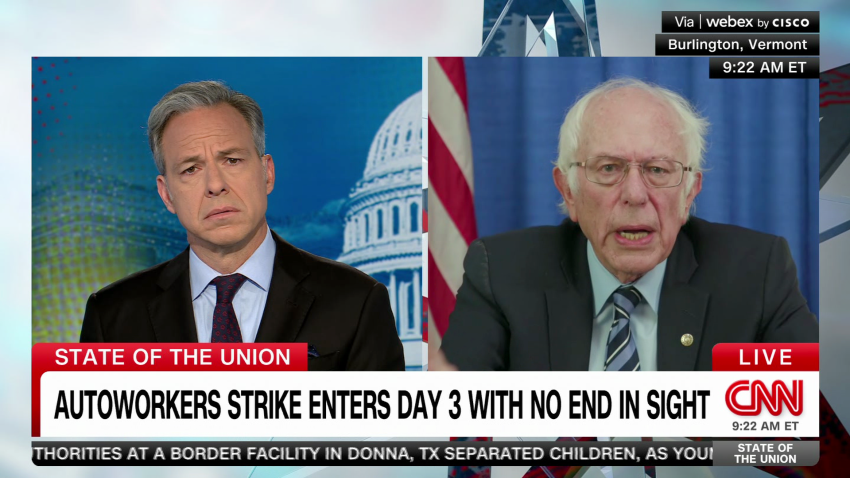Editor’s Note: Senator Bernie Sanders is the senior senator from Vermont. He is the longest-serving Independent in US congressional history. The opinions expressed in this commentary are solely his own. View more opinion on CNN.
The wealthiest people in this country have never had it so good. While income and wealth inequality in the United States is soaring, more than 60% of Americans live paycheck to paycheck, we have one of the highest rates of childhood poverty among major countries on Earth, and more than 650,000 people are homeless.

According to a study by the Rand Corporation, since 1975, there has been a nearly $50 trillion transfer of wealth in America from the bottom 90% to those at the top. Meanwhile, since 1973, weekly wages for the average American worker have actually gone down after adjusting for inflation.
It’s time for a change — real change. As more Americans are giving up on government and democracy, the time is long overdue for Congress to stand up for the hard-pressed working families of our country. And an important step in that direction would be implementing a 32-hour work week with no loss in pay.
As far back as 1866, one of the central planks of the trade union movement in America was to establish an eight-hour workday with a simple and straightforward demand: “Eight hours for work, eight hours for rest and eight hours for what you will.”
Americans of that era were sick and tired of working 12-hour days for six or seven days a week with very little time for rest, relaxation or quality time with their families. They went out on strike, they organized, they petitioned the government and business leaders, and they achieved real results after decades of struggle.
Finally, in 1916, President Woodrow Wilson signed legislation into law to establish an eight-hour workday for railroad workers. Ten years later, the Ford Motor Company became one of the first major employers in America to establish a five-day work week for autoworkers.
By 1933, the US Senate had overwhelmingly passed legislation to establish a 30-hour work week. And, just a few years later, President Franklin Delano Roosevelt signed the Fair Labor Standards Act into law and the standard 40-hour work week was created. That is the good news.
The bad news is that despite massive growth in technology and skyrocketing worker productivity, millions of Americans are working longer hours for lower wages. In fact, nearly 40% of employees in the United States are working at least 50 hours a week, and 18% are working at least 60 hours.
What this means is that the American people now have the dubious distinction of working far more hours per year as the people of most other wealthy nations.
On average, Americans work 470 more hours on the job per year than people in Germany, 300 hours more than people in France, 279 hours more than people in the United Kingdom, 204 hours more than people in Japan, and 125 hours more than people in Canada.
As a result of the extraordinary technological revolution that has taken place in recent years and decades, American workers are more than 400% more productive than they were in the 1940s. And yet, almost all of the economic gains from these technological achievements have been going straight to the top.
For example, in 1965, the CEO of a large corporation in America made about 20 times more than their average worker. Today, CEOs of large corporations make nearly 350 times more than their average workers.
At a moment in history when artificial intelligence and robotics will radically transform our economy, it is time to make sure that working people benefit from this increased productivity, not just corporate CEOs and the billionaire class.
It’s time to reduce the stress level in our country and allow Americans to enjoy a better quality of life. It’s time for a 32-hour work week with no loss in pay.
This is not a radical idea.
In fact, movement in that direction is already taking place in other developed countries.
France, the seventh-largest economy in the world, has a 35-hour work week and is considering reducing it to 32. As a result of strong unions, the standard workweek for most employees in Denmark is about 37 hours, and Belgium has already adopted a four-day work week.
In 2023, the trade union movement in Germany won a 32-hour work week for metalworkers, while autoworkers at Volkswagen and Mercedes-Benz have 35-hour work weeks. In December, Lamborghini announced that it would be moving to a four-day work week after union workers established a guiding principle: “Work less and work better.”
Pilot programs in the UK and South Africa have found that worker productivity and business revenue both go up with a four-day work week. In other words, a 32-hour work week with no loss in pay is good for workers and good for business.
In the US and Canada, more than two-thirds of workers showed less job burnout; anxiety and fatigue declined for roughly 40%; and 60% reported more success achieving a work-family balance. Almost every participant wanted to continue the program, company turnover fell by more than 20% and absenteeism by 39%. And when Microsoft tested a four-day work week in Japan, it reported a 40% increase in productivity.
Bill Gates, the founder of Microsoft, and Jamie Dimon, the CEO of JPMorgan Chase, both said last year that the advancements in technology would lead to a three- or three-and-a-half-day work week in the coming years.
As much as technology and worker productivity has exploded in recent years, there is no debate that new breakthroughs in artificial intelligence and robotics will only accelerate the transformation of our economy. Major industries like auto manufacturers are undergoing once-in-a-generation transformations, and our jobs are changing with them.
The question is: Who will benefit from this transformation? Will it be the billionaire class, or workers?
In my view, the choice is obvious.
Eighty-six years after Roosevelt signed a 40-hour work week into law, it’s time for us to move to a 32-hour work week at no loss of pay.





